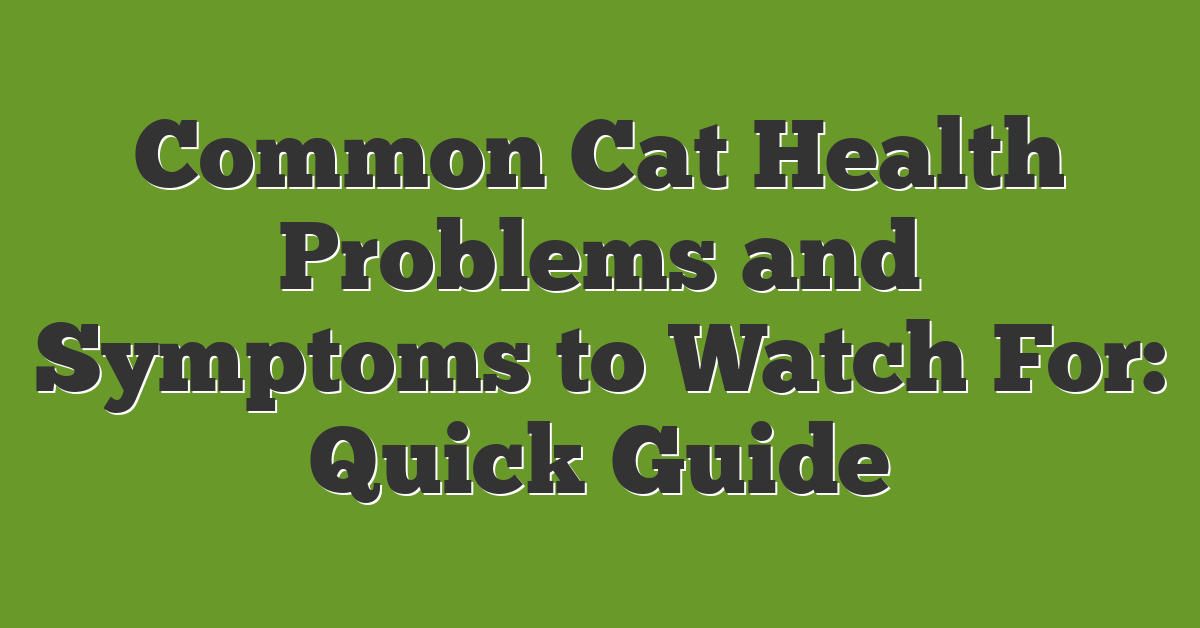Are you noticing some changes in your cat’s behavior or appearance? It’s important to stay aware of common health issues that could be affecting your furry friend. From sudden weight loss to unusual hiding spots, these signs can indicate underlying problems.

By keeping an eye out for symptoms like excessive grooming, changes in appetite, or lethargy, you can help ensure your cat stays happy and healthy. Understanding these common health challenges empowers you to take proactive steps and seek timely veterinary care when needed.
Common Cat Health Problems
Your cat’s health can sometimes be affected by various problems. Recognizing these issues early helps keep your feline friend healthy.
Respiratory Infections
Respiratory infections affect your cat’s breathing. Symptoms include sneezing, coughing, and nasal discharge. These infections can result from viruses or bacteria.
Gastrointestinal Issues
Gastrointestinal issues disturb your cat’s digestion. Signs include vomiting, diarrhea, and loss of appetite. These problems can arise from dietary changes or infections.
Urinary Tract Diseases
Urinary tract diseases impact your cat’s ability to urinate. Indicators are frequent attempts to urinate, straining, and blood in the urine. These conditions can lead to blockages or infections.
Skin and Coat Problems
Skin and coat problems affect your cat’s fur and skin health. Look for excessive shedding, bald spots, and itching. These issues can be caused by allergies, parasites, or infections.
Dental Health Concerns
Dental health concerns involve your cat’s teeth and gums. Signs include bad breath, difficulty eating, and red gums. Poor dental health can lead to more serious health issues.
Symptoms to Watch For
Stay alert to your cat’s signals. Early detection helps keep your feline friend healthy.
Changes in Behavior
Watch for shifts in how your cat acts. Signs include hiding more, increased aggression, or reduced activity. For example, a normally playful cat becoming lethargic may indicate pain or illness.
Physical Indicators
Check your cat’s body for unusual signs. Look for weight loss, excessive shedding, lumps, or changes in coat texture. Visible issues like swollen paws or discolored gums can signal health problems.
Appetite and Thirst Changes
Monitor your cat’s eating and drinking patterns. A drop or spike in appetite or water intake may indicate issues like diabetes or kidney disease. For instance, if your cat suddenly refuses food or drinks more water than usual, consult your vet.
Preventive Measures
Regular veterinary visits keep your cat healthy. Schedule check-ups at least once a year. Early detection of issues like diabetes or kidney disease ensures timely treatment.
Provide balanced nutrition to support your cat’s health. Choose high-quality cat food that meets their dietary needs. Fresh water should always be available to prevent dehydration.
Vaccinate your cat to protect against common diseases. Core vaccines include rabies and feline distemper. Consult your vet for a personalized vaccination plan.
Control parasites to avoid health problems. Use flea and tick preventatives regularly. Deworm your cat as recommended by your veterinarian.
Maintain dental hygiene to prevent oral diseases. Brush your cat’s teeth several times a week. Offer dental treats or toys to reduce plaque buildup.
Manage your cat’s weight to reduce the risk of illnesses. Monitor their diet and limit treats. Encourage regular exercise with interactive toys.
Groom your cat to keep their coat and skin healthy. Brush daily to remove loose fur and prevent matting. Check for any signs of skin issues during grooming sessions.
Create a safe environment to minimize accidents. Keep hazardous substances out of reach. Provide a stimulating space with climbing trees and hiding spots.
Reduce stress to enhance your cat’s well-being. Maintain a consistent routine and provide quiet areas. Use pheromone diffusers if your cat shows signs of anxiety.
By following these preventive measures, you ensure your cat remains healthy and happy.
When to Consult a Veterinarian
- Persistent vomiting or diarrhea: Keeps occurring more than twice in a day. It may lead to dehydration.
- Sudden weight loss or gain: Noticeable changes in your cat’s weight without a clear reason can signal health issues.
- Difficulty breathing: Rapid breathing, wheezing, or gasping indicate respiratory problems.
- Changes in appetite or thirst: Significant increase or decrease in eating or drinking habits.
- Lethargy or unusual behavior: If your cat is more tired, hiding, or acting differently than usual.
- Signs of pain: Limping, crying, or avoiding movement suggest your cat might be in pain.
- Urinary issues: Straining to urinate, frequent attempts, or blood in the urine require attention.
- Skin problems: Excessive itching, bald spots, or redness can indicate allergies or infections.
- Dental problems: Bad breath, difficulty eating, or swollen gums affect your cat’s overall health.
- Seizures or collapse: Any episodes of seizures or sudden collapse need immediate veterinary care.
If you observe any of these signs, consult your veterinarian promptly to ensure your cat stays healthy and happy.
Conclusion
Watching your cat’s behavior and appearance is key to catching health issues early. Trust your instincts and don’t hesitate to consult your vet if something seems off.
By staying proactive and attentive you can help your feline friend live a happy and healthy life. Your dedication makes all the difference in their well-being.
















